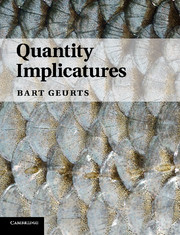Book contents
- Frontmatter
- Contents
- Preface
- Introduction
- 1 Gricean pragmatics
- 2 The Standard Recipe for Q-implicatures
- 3 Scalar implicatures
- 4 Psychological plausibility
- 5 Nonce inferences or defaults?
- 6 Intentions, alternatives, and free choice
- 7 Embedded implicatures: the problems
- 8 Embedded implicatures: a Gricean approach
- Afterword
- Notation and abbreviations
- References
- Index
5 - Nonce inferences or defaults?
Published online by Cambridge University Press: 04 February 2011
- Frontmatter
- Contents
- Preface
- Introduction
- 1 Gricean pragmatics
- 2 The Standard Recipe for Q-implicatures
- 3 Scalar implicatures
- 4 Psychological plausibility
- 5 Nonce inferences or defaults?
- 6 Intentions, alternatives, and free choice
- 7 Embedded implicatures: the problems
- 8 Embedded implicatures: a Gricean approach
- Afterword
- Notation and abbreviations
- References
- Index
Summary
In §1.4, we reviewed Grice's distinction between generalised and particularised implicatures. Grice considers an implicature generalised if it would “normally”, that is, “in the absence of special circumstances”, be associated with “a certain form of words” (Grice 1975/1989: 37; see p. 17 for a longer quote). Particularised implicatures, on the other hand, are contingent on specific features of the context. Though the distinction between generalised and particularised implicatures may have been of strategic importance to Grice, he didn't see them as separate species: according to him, both generalised and particularised implicatures spring from the same pragmatic sources; it is just that, due to extraneous circumstances, the former happen to arise “normally”. Hence, an obvious question to ask is why this should happen to be so: why should implicatures be standardly associated, or at least seem to be associated, with some expressions but not with others? This is one of the questions to be addressed in the following.
As Grice observed, from generalised implicatures it is but a treacherously small step to the notion that implicatures may be conventionally associated with certain expressions. If the use of “some” normally gives rise to a “not all” inference, it is tempting to suppose that “not all” is part of the lexical content of “some”. Of course, one must be careful not to claim that “not all” is part of the lexical meaning of “some”, for after all it is cancellable.
- Type
- Chapter
- Information
- Quantity Implicatures , pp. 83 - 104Publisher: Cambridge University PressPrint publication year: 2010



